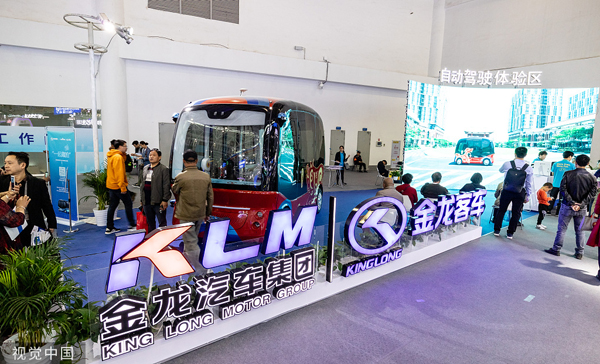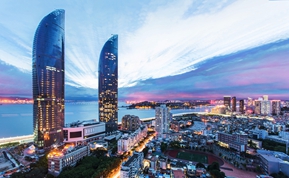Consumption bolsters economic growth in Fujian

A bus produced by King Long Motor Group is on display in Fuzhou, East China's Fujian province, on May 7, 2019. [Photo/VCG]
The per-capita consumption expenditure of Fujian residents reached 12,521 yuan ($1,868.8) in the first half of 2019, ranking 7th among 31 provinces in China, official data shows.
Over the period, the total retail sales of consumer goods in the province reached 762.103 billion yuan, up 11 percent year-on-year, 2.6 percentage points faster than the national average.
The province's rising consumption is largely due to the upgrading and optimization of consumption structure, shifting from traditional commodities to emerging services.
The consumption growth rate was four percentage points faster than that of investment in fixed assets, making it an important engine driving the province's economic growth.
Consumption has played a major role in driving China's economic growth in recent years. In the first half of the year, consumption contributed 60.1 percent of China's economic expansion, according to the National Bureau of Statistics.
Consumers in Fujian purchase high-quality commodities with increasing frequency. Official data shows that new energy vehicle sales in the province from January to June were 2.5 times than the same period last year.
Spending on communications, cosmetics, jewelry, furniture and clothing enjoyed double-digit growth, while consumption of commodities such as books, newspapers, magazines, sports and entertainment saw a rise of 20 percent.
The integration of online and offline retail sales has been further boosted in the province as it has been rolling out a series of policies and measures to boost the application of the new retail model in recent years.
Fujian-headquartered supermarket operator Yonghui has been actively promoting non-cash payment services at brick-and-mortal stores across the country. Thus far its online service app has garnered 150 million users across the country.
Yonghui has teamed up with tech behemoths such as Tencent, as it looks to leverage technologies such as big data and facial recognition to increase economic growth.
Rural e-commerce is also boosting consumption power in rural areas in Fujian.
Statistics show that in the first half of the year, the total retail sales of consumer goods in rural areas of the province reached 72.28 billion yuan, a yearly increase of 12 percent.
The per capita disposable income of the province's rural residents was 9,308 yuan, an increase of 7.7 percent in real terms after deducting price factors, 1.2 percentage points higher than that in urban areas. The scenario indicates a strong consumption market in rural areas, noted Tang Jie, associate professor of economics at Fujian Normal University, adding that more new products and services should be provided in those areas.
Why Xiamen
-

Xiamen is one of the most economically competitive cities in China and was one of the first Special Economic Zones on the Chinese mainland. As a vice-provincial city independently listed on the State development plan, it has provincial-level authority in economic administration and local legislative power. In 2010, the Xiamen SEZ was expanded to cover the entire municipality. Today, Xiamen is a modern and international port city.
